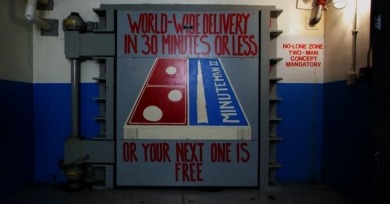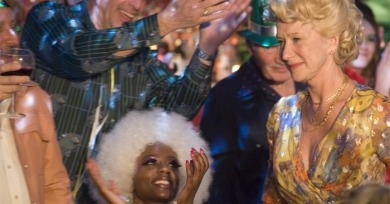Reviews
Typical of the writing and pacing in director Aaron Schneider’s film is a line from the funeral director’s assistant, drawn out for so long that sighs from the audience are audible between his pauses: “You wanna be at your funeral. Party. Alive? But. You can’t have a funeral if you’re not. Y’know. Deceased.”
The problem for Countdown to Zero is how to address the issue cinematically. The threat of nuclear destruction has been endlessly treated in the movies as both theme and MacGuffin ever since Hitchcock’s pre-Hiroshima production of Notorious.
Sally Potter’s marvelous 1992 film of this undeniably strange, altogether wonderful book now makes its way back to theaters after a digital restoration, and in a bleak cinematic landscape, this oddball film feels especially vital.
Given the infrequent cinematic output of Terry Zwigoff, bitter, parodic, button-pushing misanthropy is rarely represented at the local art house. But Solondz has not helped fill the void. If anything, he precipitated it.
Since his parched but accomplished 2000 debut, Following, the British-born writer-director has been compared to Stanley Kubrick, and not because he has an awesome beard (he doesn’t). Like Kubrick, Nolan revels in the visual possibilities of remove, and is inclined to linger on agony more than ecstasy.
Not long into Nicolas Winding Refn’s new Viking film, Valhalla Rising, the main character, the mute and mutilated One-Eye (Mads Mikkelsen), beheads an opponent with the rope that tethers the cyclopean brute to a post in the ground.
Escapist in the truest and least perturbing sense of the word, this conceptually gentle but artistically bold fiction-documentary hybrid takes viewers to a lush, vivid natural world—the second largest coral reef on the planet, the Banco Chinchorro to be exact, located in Quintana Roo, Mexico.
Viewers of Slovak filmmaker Péter Kerekes’s rather banally titled documentary may be pleasantly surprised to find not an orderly history of cooking, moving methodically, dish by dish, from past to present, but rather an attempt to actually cook history via cinematic slicing, dicing, stirring, and simmering.
Rivette works in miniature, gracefully orchestrating a modest story set against the backdrop of Saint-Loup Peak, a geological marvel crowning the genteel Languedoc region of southern France.
His choice to tackle this fictionalized story of Nevada’s notorious Mustang Ranch, the state's first legalized brothel, marked a chance for him to reconnect with Devil's Advocate sleaze, but Love Ranch’s tameness and sentimentality hints that the 65-year-old, whose most recent movie was 2004's Ray, is softening.
Like this year’s other great paean to the cinema, Inglorious Basterds, Wild Grass is all about movie living and loving, but like Tarantino’s film, the idiosyncrasies of the filmmaking never outpace the idiosyncrasies of its characters.
While Hollywood has always been invested in catching war from the front lines, the cinematic output born of this particular moment has far exceeded that of any previous combat situation.
Occupying a strange zone between nostalgic homecoming and generalized snapshot of Middle America, Bill Ross IV and Turner Ross’s pleasantly lackadaisical documentary 45365 observes daily life in the brothers’ native Sidney, Ohio.
Abandoning the freewheeling ingenuity of his previous period adaptations (Jude, The Claim, Tristram Shandy), as well as the frenetic pacing of docu-realistic dramas like In This World or A Mighty Heart, Winterbottom’s latest effort, though enthralling on the whole, sometimes feels too literal for its own good.













